Monthly Archives: February 2016
Nevada went mildly worse than I had feared, though my predictions for who wins remains unblemished. That likely ends today with so many states up.
Everything is increasingly coming up Trump. The main sources of uncertainty with me had been (a) What about caucuses, (b) he wasn’t picking up momentum, and (c) the other campaigns hadn’t targeted him. With Nevada and in the week or so since, he’s won a caucus handily and seems to have started picking up momentum despire a barrage of attacks ranging from the substantive to playground taunts. So far, it appears he is unfazed. If there is momentum against him that has not been picked up by the polls (which is possible) then we will find that out today.
I can’t do the historical placement marking today because first place, second place, and third place don’t matter nearly as much. We’re going to be getting a large number of results at once. Ostensibly, the thing that matters the most will be the delegate count. However, Rubio and Cruz have other metrics by which their viability will be judged. So here is what each candidate needs to accomplish:
Donald Trump needs only to establish the status quo. He can actually afford to slide a little and still be in the catbird seat as he will still win most of the states and has a good chance of picking up over 50% in one of them. But even failing that, he is in the position that a nominee is usually in. He has special liabilities, but it is what it is. If he can win Texas and sweep the map, or if he can win every state but Texas, it becomes very difficult to see how he loses the nomination even if Trump fatigue starts to set in and even if it becomes a 1-on-1 race with Cruz or Rubio.
Ted Cruz needs to have a good day. He’s had a bad week of being eclipsed by Rubio in the press. On the other hand, the press has always been unusually hard on him and his numbers have held up better than Rubio and others would have hoped. So he has a good chance of accomplishing his goal of both (a) winning Texas and (b) winning more delegates than Rubio. This primary is in his home turf. He could do better than that by winning some other states. If he can win more than just Texas, and Rubio doesn’t win anything substantive (or only wins Minnesota), he could be the go-to-guy if Trump ever does implode. Given that this is his turf, though, he has limited margin of error. The map only gets tougher from here.
Marco Rubio needs to win a state. Winning a state is really a symbolic gesture, but attempts by the campaign to define expectations down so that he doesn’t need to win a state are – at least for me – unsuccessful. If he doesn’t win a state, and Cruz wins Texas, the rationale of his candidacy starts getting much more difficult. If he doesn’t win any states or only wins Minnesota, but Cruz wins multiple states, the same applies. He might be able to continue a zombie candidacy as the candidate to whom people with nobody else to go to go to, but it will probably lock him out of Florida and, by extension, any reasonable chance at the nomination either with delegates or a convention. Further, even if a poor showing does not lead to consolidation around Cruz, the party may more openly start exploring other options which will again undermine his candidacy (and, in effect, be ceding the nomination to Trump.)
Elizabeth Picciuto pushes back against the mockery Donald Trump received for saying five magic words:
What is funny about saying “I love the poorly educated”? Of course Trump loves poorly educated voters. Who else would be asinine enough to buy his tripe?
But some of the same people who have been laughing because he said he loves the poorly educated also denounce voter ID laws. Why? They disenfranchise Americans who are disproportionately lower-income workers, minorities — and poorly educated.
They denounce the laws because they believe — rightly — that an education is neither necessary nor sufficient for thoughtful democratic participation.
Michael Drew also put together a Tweet Storify on the subject, with a similar theme. Because he tends to split his tweets mid-sentence, it’s hard to embed a tweet, but the best part is:
If you self-identify as undereducated and feel bad about it, you’re allowed to hear those words and take them at face value. Even if you’re poorly educated, the guy “loves” you (after a fashion) and wants to be greedy for you.
I might go a step further than Drew and say you don’t even have to feel bad about it. You just have to know that other people see you that way. And so Trump’s comment may have used the wrong word, but because of the message he gets the benefit of the doubt among potential Trump people in a way that someone else, or a different Trump with a different campaign theme, might not.
I confess that my original response to hearing the phrase was a bit of an eyeroll, but some of the pushback (both of these and others) convinced me otherwise.
The other factor is that, of course, Trump is Trump. One of the challenges of opposing him is the benefit of the doubt that he gets by virtue of being himself. He really can say things that nobody else can. A substantial minority of the population really wants to like him.
To look at the other side of the equation, you have Ted Cruz. I’ve seen bafflement from more than one place that he has been so quickly disregarded for such small margins. Cruz fans are upset that he’s getting the reputation for being a mean attack dog when Rubio is similarly on the attack. They’re also exasperated that while Cruz has gone after Trump, he’s still being remembered as the guy who cozied up to him.
But that’s exactly what happens when people have no reason to want to like you. A lot of people want to like Trump because of his novelty. Some love his outrageous comments, but yet others will let the ones they disagree with go because you take the bad with the good. Cruz just doesn’t have that well to draw from. He speaks to a narrow audience, and so people that are not a part of that narrow audience have no reason to cut him some slack.
And, of course, the media, which has a lot of reasons to like Trump – albeit not like-like him – and fewer reasons to like Cruz.
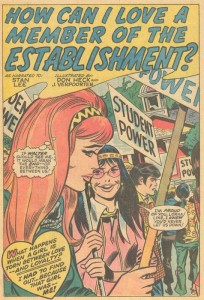 I’m not sure whether the tendency of former French presidents to get indicted is because they demand integrity, are particularly corrupt, or prosecution-as-politics, but is the sort of thing that makes me think it’s not so bad that Ford pardoned Nixon.
I’m not sure whether the tendency of former French presidents to get indicted is because they demand integrity, are particularly corrupt, or prosecution-as-politics, but is the sort of thing that makes me think it’s not so bad that Ford pardoned Nixon.
Of course, Republican governors have a tendency to become subject to very overzealous prosecutors when they plan to run for president, such as Rick Perry, whose charges have been dismissed.
The Trump phenomenon has so many fathers (such as), and is yet an orphan. For my own part, I find fault in my own ideas regarding the party that gave way to Trump, most notably in my dismissal of immigration concerns. On the other hand, it’s really not all about immigration.
Clay Shirky explains how political parties have become hosts for independent campaigns.
Attention Gannon! If you’re out there. In England and Wales, more babies are being born to women 35 and over than women younger than 25.
Jason Bedrick takes a crack at the study that found poor results from Louisiana’s voucher program, arguing that the problem is regulation. Maybe, but the regulations they cite actually seem prudent to me.
As immigrants assimilate and intermarry, it’s becoming harder to see the lines and count the people on each side.
Edwin Lyngar is worried that we have become addicted to fear. I agree, and might cite this as an example.
If you want to live to 112, the solution apparently involves chain smoking. Maybe this is why advocates are trying to convince me that my smoking cessation wasn’t good for my health.
The EPA says that it has cleaned up after the Gold King Mine disaster, but locals aren’t so sure.
Having a child has likely changed my politics in some subtle ways I do not realize, but one overt change is my views on funding PBS, so this makes me happy.
Florida is stepping up enforcement against left-lain snails.
For Sale! The most troubled half of one of our most troubled states.
Well, with all of the babies being born in Utah, I suppose this was bound to happen at some point.
If you’re looking to leave the country when Donald Trump becomes president, Nova Scotia may want you!
So Elizabeth — when she was young, very charming, very, very charming. Could't have a baby. Sad. Really sad. https://t.co/9RRlJUZzyb
— Katherine Miller (@katherinemiller) February 23, 2016
I mean, she just wanted a little baby. Waited years and years. Didn't happen. No kids. Very sad. I mean, years go by. Years.
— Katherine Miller (@katherinemiller) February 23, 2016
Alan Jacobs recently wrote about a former colleague at Wheaton College who during a class decided to skip on a couple of the assigned readings. This colleague
devoted two weeks to studying a book and then, at the end of that time, said to his class, “I don’t think that went as well as it should have. Let’s do it again. We’ll have to leave out the next book or two on the syllabus.” Some students — I don’t know how many — went ballistic over this. That’s not what the syllabus says! I’ve already bought those other books and now we’re not even going to read them! Some faculty and administrators became concerned over this “lack of professionalism”; they wondered whether Wheaton could afford to have faculty “the students don’t really respect.” Me, I just wished I had the courage to go off-script that far;….
Now, the main point of Jacobs’s post was about racism at Wheaton. Jacobs’s colleague was black, and Jacobs suggested that his colleague likely got more push back from administrators because he was black than he would have if white. I’m not commenting on that aspect of the post.
What I want to comment on is why it’s usually wrong to skip assigned readings.
One, books cost money. Sometimes a lot of money, sometimes not a lot of money. Not all students–even, I imagine, at Wheaton–are independently wealthy.
Two, in some cases, a student may choose to take a class based on the assigned readings. I can’t say for sure that I ever did, bu when I registered for classes, sometimes I did look forward to certain of the assigned readings. I would have been upset if the readings hadn’t been assigned. The obvious retort is that I could have read the book anyway. But that neglects what one gets from reading a book in class. Sometimes classroom discussion or the guidance of the instructor helps one understand and appreciate a book. Maybe that’s not true for everyone, but it was sometimes true for me. One of my favorite books of all time–a collection of short stories, Dubliners–I read for an English lit class and I’m convinced I would not have understood or appreciated many of James Joyce’s allusions. I might not even have understood some of the stories.
Three, “going off script” and changing the syllabus means the instructor planned poorly. Maybe it’s sometimes necessary to go off script. In at least one class I taught when I was an adjunct, it would have behooved me to go off script because I had too poorly anticipated the classroom dynamics. And while doing so would have been admitting failure, it was more of a failure for me to keep on as I was doing. So I get that sometimes it needs to be done. But it’s still a mark of poor planning.*
There is such a thing as over-entitlement among undergraduate students (and especially among graduate students, but that’s a different story). And part of going to college is learning that life isn’t always fair and learning how to adapt to changing circumstances. I get it. But instructors need to realize that they have an obligation, too. Whether my admonition actually applies to the case Jacobs is talking about or not, I don’t know because I don’t know the specifics. But on the facts as Jacobs relates them, the students’ complaints weren’t baseless.
*Not exactly the same thing, but as an undergrad I was particularly frustrated with some professors’ practice of changing, at the last minute, an in-class exam to a take-home exam. Take-home exams are MORE WORK. Even if the professor says “I only want you to spend an hour on it,” they’re going to grade you as if you had more than an hour to work on it. If a student has to work, he or she likely has to plan a tight schedule to balance work and studies, and fitting in even an extra hour of schoolwork can be hard.
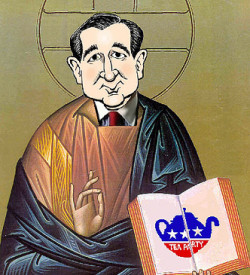 It’s a two-man race! Or a three-man race! Or a four-man race! It depends on how you count it. There are four credible candidates remaining, three with a chance at winning the nomination, and two with a credible chance of winning the nomination. Or so it appears at the moment.
It’s a two-man race! Or a three-man race! Or a four-man race! It depends on how you count it. There are four credible candidates remaining, three with a chance at winning the nomination, and two with a credible chance of winning the nomination. Or so it appears at the moment.
The immediate response after South Carolina was: Good for Trump, Goodish for Rubio, Bad for Cruz. My own account, almost immediately, was that it was very good for Trump, kinda bad for Rubio, and really bad for Cruz. The second-place tussle between Rubio and Cruz ended up being a sidestory. They effectively tied. The big news were the gaps between the two of them and everybody else. To the north of them was Trump, whose ten point victory was extactly what the anti-Trump faction(s) did not need. Below them was a 10+ point gap with everyone else, which was exactly what those two needed. Which gap was the bigger deal? I’m rather strongly inclined to believe the first, and after a couple days of trying on narratives, it appears that the consensus is with me.
I’m not yet convinced that Trump cannot be beaten, but for the first time I am putting his odds at greater than fifty percent (roughly 55%-25%-10%-10% for Trump-Rubio-Cruz-??). It would be even better had Cruz managed to beat Rubio with just a bit of daylight, but it was more than enough. The good news for Rubio is that as not-great as his night was, Jeb is out and Cruz’s night was so bad that it ultimately redounds to his benefit as well as Trump’s as he starts getting the nationwide establishment support he has long needed. Cruz’s path to the nomination was already narrow, and he could run some rather bad publicity going into Super Tuesday.
Or maybe not, and that’s Rubio’s problem. Nevada is almost all downside and no upside for Rubio. It had been an afterthought, but I’m convinced that it is critically important for the two major candidates not named Trump. And it’s important for Trump, too. But it offers Cruz an opportunity to reverse his fortunes just when he needs to. And that would, of course, be terrible news for Rubio whose main path to the nomination involves Cruz abandonment on Super Tuesday. It’s Ground Game vs Fundamentals. The Fundamentals should favor Rubio between the two of them. He has ties to the state and ties to Mormonism. If not for the Trump Cloud, he would probably be winning that state. Cruz, on the other hand, has the legendary campaign apparatus and in a caucus that matters a great deal. Advantage: Cruz. And by extension, Trump. Trump can survive a loss, but he does need to win. The polling is so favorable to him right now it will open up questions if he doesn’t (despite the fact that polling in Nevada is notoriously unreliable). But Trump is Trump, and momentum has not proven to be worth anything this primary.
This is going to be the last week that placement matters. On Super Tuesday, it will be all about delegates and states. I’m not sure how I’m going to handle it for the post but I do have some ideas. Here we go for this week:
Donald Trump
1st Place: This doesn’t have to happen, but it’ll be a big hit if he doesn’t. And if it does, it’ll cause a week of party uncertainty that will serve him very, very well.
2nd Place: He’ll be okay. The good news about being the frontrunner is that you can afford stumbles. This would qualify as a stumble, though.
3rd Place: This would qualify as more than just a stumble, but nothing he can’t rebound from. If the news feedback is bad, it could make it truly a three-person race. The press may shrug, though.
Ted Cruz
1st Place: Worst-case scenario for Rubio. This doesn’t necessarily make him competitive, but it would help.
2nd Place: This would be a very good outcome, assuming that he beats Rubio. He can point to Rubio’s connections with the state and institutional advantage and say “And I beat him anyway!” It’d be the first time he beats the expectations game.
3rd Place: Not a good outcome. If he keeps it close he will be okay. If not, the press (which is already hostile to him) will be mercilous and he has to start really worrying about Super Tuesday. Best case for him here is that the press spends more time talking about Rubio.
Marco Rubio
1st Place: This could make it a competitive two-person race, but probably not. It could, at least, break the fever of Trump’s inevitability. It wouldn’t necessarily even do that.
2nd Place: This keeps him going.
3rd Place: This makes it really hard for him to do what he needs to do to win the nomination.
Joel Kotkin discusses the Geography of Inequality and how housing is exacerbating the two Americas. More from Wendell Cox.
Bjorn Lomborg argues that sometimes it’s not worth fighting third-world corruption.
Joseph Pearce writes of rescuing maidens from the dragon culture.
Eleanor Sharman explains how she became a victim of feminism.
It sure seems to me that the University of Idaho is headed for the Big Sky Conference. New Mexico State may have an easier time of it.
A liberal clerk of Scalia sings his praises.
Jack Smith investigates why batteries on ecigarettes, hoverboards, and other electronics keep exploding.
Are trafficked prostitutes victims or perpetrators of crime?
As far as “How to fix Twitter” suggestions go, these from Randi Harper seem really good. I think it’s important to allow pseudonymity, but favoring those who are willing to unmask – or at least submit their phone number to Twitter itself – seems prudent.
The $3,000,000,000,000 wealth transfer of the Oil Crash.
Companies tracking employee pregnancies seems creepy, but Emily Crockett says we shouldn’t be so freaked out.
George Packer investigates why leftists go right.
What can Bernie Sanders really do about mass incarceration? Ryan Cooper says that he can lead the way on bail reform.
In order to continue accepting welfare benefits, Utah may be requiring “Self-Reliance Training.”
Christian Jarrett reports that contrary to what we might think, our brains do better in the winter than the summer. I’d always thought that was the case for me, but I figured it had to do with being raised in the southern heat when winter is the only tolerable season and summer is exhausting in its very existence.
1. A little riff on what America today's political dysfunction means for capitalism.
— Richard Florida (@Richard_Florida) February 14, 2016
2. You don't have to be a neo-marxist to recognize that dysfunction in American politics especially in the GOP is not good for capitalism.
— Richard Florida (@Richard_Florida) February 14, 2016
3. A key function of government is to maintain the integrity of the economic system & enable so-called "capitalist accumulation."
— Richard Florida (@Richard_Florida) February 14, 2016
So Donald Trump exceeded expectations in New Hampshire to the point that I almost immediately upgraded his possibilities. It wasn’t so much that he won, which was expected, or that he got 35% in and of itself, but that he over-performed. That adjusts everything because it means I can no longer look at Trump-friendly polls with the degree of skepticism that I had been. His support is real, and according to exit polls strikingly uniform across almost every line. In a state where immigration did not rank as an issue. He remains a Shibboleth executioner, with uncertain ramifications. While the collapse people have been waiting for since August isn’t happening, there is some evidence of potentially weakening support. How much remains to be seen. I am a lot less worried that he will get 40% than I was. Even 35% seems less likely. On the other hand, South Carolina is allegedly a state where he has an unusually good ground game. And it’s an open primary and not a caucus. I ran a bunch of numbers and if Trump gets 37% of the vote, he may have some difficulty getting the nomination outright, and I suspect he has difficulty getting the nomination from a brokered convention. The good news for Trump is that if he underperforms, there’s a decent chance he immediately rebounds in Nevada.
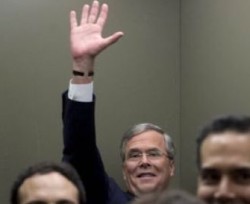 In Bushland, things are looking awfully bleak for Jeb Bush with the first real rumors that he might drop out surfacing and indications that it might be as soon as Sunday. It’s possible that this is a skewed representation, but the vibe on Twitter from the campaign is that of a deflated candidate. Which must mean that there are internals showing a much more dour picture than the public polls, which range from “terrible” to “fighting chance.”
In Bushland, things are looking awfully bleak for Jeb Bush with the first real rumors that he might drop out surfacing and indications that it might be as soon as Sunday. It’s possible that this is a skewed representation, but the vibe on Twitter from the campaign is that of a deflated candidate. Which must mean that there are internals showing a much more dour picture than the public polls, which range from “terrible” to “fighting chance.”
Ben Carson looks like he might be approaching the end of his campaign sooner rather than later. Unlike Kasich and Bush, this may prove to be helpful to Trump as the “second choice” numbers are not great, but anything that helps move Trump to 40% is good for him, and this would move him without putting someone else closer to him. He doesn’t seem to gain a majority of Carson’s support, but nobody else gains more.
Who knows what exactly is going on with John Kasich, other than that some polls really like him and others don’t.
In the last installment, I said that Marco Rubio was “done” if he didn’t place in the top four in New Hampshire. That appears to have been premature as he has rebounded impressively. I had not counted on #3-5 all being within a point of one another in essentially a tie. Some are pointing at his rebound as an example of press being deferential, but I think it’s mostly earned. When you’re down, it’s easy to spiral into self-destruction and he didn’t. There is also a reason why he keeps getting a degree of credibility above what his poll numbers indicate, which is that the potential has always been there. That said, the liabilities are also. Some of the late poll movement appears to be in his direction, though other poll movement not-so-much. Which is par for the course in South Carolina polling this time around.
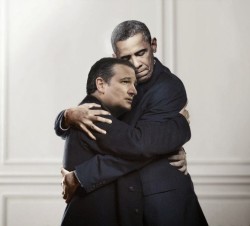 Which leaves us with Ted Cruz, and the uncertainty surrounding him. I’m getting a pretty desperate vibe from him, and South Carolina is a state where he has to do well. Most of the polling has him where he needs to be, but some outliers suggest that he could fall behind Rubio. If that happens, it’s going to be difficult for him. The uniformly seering contempt the other candidates have for him may be dogging him, and he has run into consecutive bad news cycles as various unsavory campaign actions come to light. If he falters, the beneficiary may to be Rubio. As much as Rubio seems to be shaping up to be the Establishment candidate, indications are that there is a lot of crossover potential. Unidirectional, though, because Cruz supporters presently seem to like Rubio more than the other way around. But while Cruz has the most to lose from this particular state, he also has the most gain. If Trump’s support is softening and he can be neck-and-neck with him and Rubio a distant third, he gets the “Two man race” narrative that he needs (at least for a cycle). Unfortunately, he’s made it increasingly tough for the rest of the party to rally around him. After New Hampshire, I was really high on his chances. Right now, I’m not.
Which leaves us with Ted Cruz, and the uncertainty surrounding him. I’m getting a pretty desperate vibe from him, and South Carolina is a state where he has to do well. Most of the polling has him where he needs to be, but some outliers suggest that he could fall behind Rubio. If that happens, it’s going to be difficult for him. The uniformly seering contempt the other candidates have for him may be dogging him, and he has run into consecutive bad news cycles as various unsavory campaign actions come to light. If he falters, the beneficiary may to be Rubio. As much as Rubio seems to be shaping up to be the Establishment candidate, indications are that there is a lot of crossover potential. Unidirectional, though, because Cruz supporters presently seem to like Rubio more than the other way around. But while Cruz has the most to lose from this particular state, he also has the most gain. If Trump’s support is softening and he can be neck-and-neck with him and Rubio a distant third, he gets the “Two man race” narrative that he needs (at least for a cycle). Unfortunately, he’s made it increasingly tough for the rest of the party to rally around him. After New Hampshire, I was really high on his chances. Right now, I’m not.
After New Hampshire, my internal odds went from roughly one-third to Rubio and Cruz and a fifth to Trump to around 40% for Trump and Cruz and 20% for “other” (including Rubio, Kasich, Jeb, and a brokered convention that either Mitt Romney or Paul Ryan would come out of, if not one of the actual candidates).
Here is the breakdown of what each candidate needs to happen:
Donald Trump
1st Place: This needs to happen. If it does, then what it does for him will be determined by the placement of the other candidates.
2nd Place: This can happen, and Nevada can supply a rebound for him to help him get back on track. It will still speak to some vulnerability, though.
3rd Place: I don’t want to say he’s done because I was wrong about Rubio, but… it’s hard to see how he comes back.
4th Place: He’s done. Dammit, he’s done. Done. Has to be. Right?
5th Place: He’s done.
Ted Cruz
1st Place: If he can eek this out, this would definitely give him a much-needed leg up on Rubio and would help set the stage for a two-person race.
2nd Place: Assuming that he’s behind Trump, this would be a good outcome for him. If Rubio doesn’t get third or he’s closer to Trump than Rubio, a really good outcome. His path to the nomination doesn’t look great, but it would more likely be said to have started in South Carolina than Iowa if it did happen.
3rd Place: South Carolina should be Cruz country, and a third placing would hurt. Nothing that he couldn’t bounce back from, but it would be tough. He’d need to do really well in Nevada because there are a lot of people looking for reasons to dismiss him. Still, though, it would be a three-person race. This might be the perfect outcome for Trump.
4th Place: He’s in trouble.
5th Place: He’s done.
Marco Rubio
1st Place: He’s in a really good position for the nomination. Naysayers will say, not without justification, that he had a lot of institutional support in South Carolina. In all likelihood, though, this will give him institutional support in a lot of primary states if it happens. It is, of course, rather unlikely to happen.
2nd Place: This, too, would give him some institutional support in other states. Assuming Cruz places third, it likely creates a three man race. Which is not great because three is hard to win from, but it gives him a fighting chance and puts Cruz in a position of weakness where a lot of people want him.
3rd Place: This is the most likely result, and wouldn’t be a bad one as long as Cruz isn’t #1. If there is distance between him and Kasich and Jeb, then he starts getting a lot more support. And if Jeb is out of the race, he stands to benefit. It likely becomes a three-person race, though he runs the risk of being perpetually third. Which after New Hampshire wouldn’t be a bad outcome. It would make him a viable candidate for 2020.
4th Place: This would mean that either Jeb or Kasich beat him. I’m again reluctant to say that he’s done, but I don’t know how he would recover. Unless it’s because of a Jeb/Kasich shocker, it would mean that the support assumed for him simply doesn’t exist, and not because of a bad debate performance.
5th Place: He’s done. DONE. I’m sure of it. Almost sure. Pretty sure.
John Kasich
1st Place: Wow. He’d be the third candidate in a three-person race or the second in a two-person race. He’d still have something to prove, but he’d be well on his way to proving it.
2nd Place: He’s likely included in a three-person or temporary four-person race. This would mean that Cruz or Rubio placed fourth, and whichever that is will be pretty vulnerable. He’d be getting a lot of money to launch a national campaign.
3rd Place: He’d likely stay in the race and hope to win over Jeb and/or Rubio supporters. Very good outcome.
4th Place: He might stick around to see if he can get some Jeb/Rubio supporters, but if it’s not obvious that he benefits he’s probably out.
5th Place: He’s done.
Jeb Bush
1st Place: I don’t even know.
2nd Place: Jeb Bush: Rubio-Slayer. This would be an amazing comeback.
3rd Place: He might knock Rubio out if this happens, assuming that Cruz is #2. If it’s not a virtual tie. If it is a virtual tie, his campaign might not survive according to some sources.
4th Place: Indications are that he will be officially done.
5th Place: Officially done.
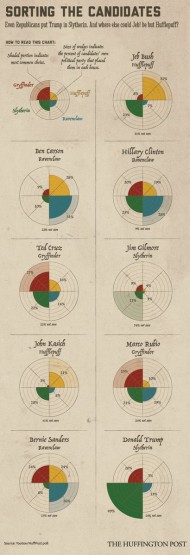 I didn’t know that there was a relationship between Donald Trump and Roy Cohn. Well, I guess they are both Democrats…
I didn’t know that there was a relationship between Donald Trump and Roy Cohn. Well, I guess they are both Democrats…
It seems that an awful lot of politicians are Slytherins.
Some day, I’d love to write book reviews as good as this one.
Advocate though I am, I would not be surprised if vaping does indeed have negative effects on the immune system. But please, the implication that it’s more dangerous than smoking has got to stop being the “hook.” It’s almost certainly bad for the public health.
When free healthcare coverage isn’t free, it can come out of your estate.
I know what this map is supposed to indicate, but to me it actually indicates that some foreign countries have unexpectedly good education outcomes.
Eric Morath argues for a five-tiered federal minimum wage. Better than a single, aggressive minimum wage, but I’d prefer this be dealt with a lower levels of government.
Do not throw alligators through drive-thru windows. You can, however, eat them for Lent.
Rhiannon Lucy Cosslet looks at a YouGov poll on “sleeping with the enemy” (someone of different political persuasion) and explains why she may kiss a Tory but never marry one and Margaret Corvid explains why political dating websites are good.
Jason Brennan argues that closed border advocacy arguments lend themselves to anti-liberty arguments.
The science of cities is looking at universal rule of business/city growth.
Here’s a novel NIMBY argument: If you build that elevated train, pedophiles will look at our children.
Meghan Neal writes of the tension between term papers and Wikipedia articles. What is the best focus of a brilliant mind, term papers or Wikipedia articles?
The ABA is cracking down on underperforming law schools with simpler-but-tougher bar-passage requirements.
Interesting: For the first time in 35 years, Princeton will accept transfers. Diversity goals is one motivation, athletics another.

